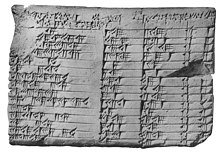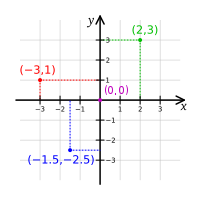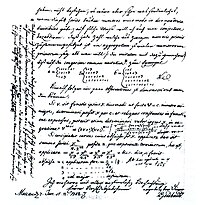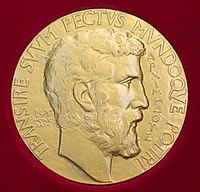-
Use Cases
-
Resources
-
Pricing
Ancient Mathematics
Oldest Known Mathematics Textbook
1650 BCE
% complete
The Rhind papyrus, dated from around 1650 BCE, is the oldest known mathematics textbook, providing valuable insights into ancient mathematical practices.
Image source: Rhind Mathematical Papyrus

Greek Mathematics Emerges
600 BC - 599 BC
% complete
Greek mathematics began to emerge as a distinct discipline, with achievements in conic sections, trigonometry, and the beginnings of algebra.
Image source: Greek mathematics

Diophantus and al-Khwarizmi
200 - 299
% complete
Diophantus and al-Khwarizmi made significant contributions to the development of algebra, laying the groundwork for future advancements in the field.
Image source: Diophantus

Development of Combinatorics
1600 - 1699
% complete
Combinatorics, a branch of mathematics, was studied for much of recorded history before becoming a separate area in the seventeenth century.
Renaissance Mathematics
Introduction of Projective Geometry
1500 - 1599
% complete
Girard Desargues introduced projective geometry, expanding upon Euclidean geometry and adding points at infinity, leading to new insights and applications in mathematics.
Image source: Projective geometry

Emergence of Algebra
1500 - 1599
% complete
Algebra became a distinct area with François Viète's introduction of variables for representing unknown or unspecified numbers.
Image source: History of algebra

Introduction of Cartesian Coordinates
1600 - 1699
% complete
René Descartes introduced Cartesian coordinates, revolutionizing the field of geometry and paving the way for modern algebraic methods.
Image source: Cartesian coordinate system

Introduction of Infinitesimal Calculus
1600 - 1699
% complete
The introduction of infinitesimal calculus by Newton and Leibniz marked a major breakthrough in mathematics, leading to revolutionary developments in various scientific disciplines.
Introduction of Calculus
1600 - 1699
% complete
The introduction of calculus by Newton and Leibniz revolutionized mathematical analysis and provided powerful tools for solving a wide range of scientific problems.
Modern Mathematics
Unproven Goldbach Conjecture
1742
% complete
The Goldbach Conjecture, stated in 1742 by Christian Goldbach, remains unproven despite extensive efforts by mathematicians.
Image source: Goldbach's conjecture

Discovery of Non-Euclidean Geometries
1800 - 1899
% complete
Mathematicians discovered non-Euclidean geometries, challenging the traditional Euclidean framework and leading to new insights into the nature of space and geometry.
Image source: Non-Euclidean geometry

Development of Modern Pedagogy
1800 - 1899
% complete
Mathematical curriculum flourished in France and Germany in the 19th century, leading to the development of modern pedagogical methods in mathematics.
Image source: Mathematics education

Geopolitical Analysis
1800 - 1899
% complete
Nicolas-Remi Brück and Charles Henri Lagrange extended mathematical analysis into geopolitics, demonstrating the broad applicability of mathematical concepts in diverse fields.
Introduction of Mathematical Logic
1900 - 1999
% complete
Mathematical logic emerged as a distinct field, challenging traditional approaches and leading to the development of new foundational concepts in mathematics.
Development of Mathematical Abstraction
1900 - 1999
% complete
Mathematicians began to explore mathematical abstraction from reality, leading to the development of formalism and new philosophical perspectives on the nature of mathematical objects.
Challenge to Mathematical Foundations
1900 - 1999
% complete
Mathematicians led by Brouwer challenged the foundations of mathematics, promoting intuitionistic logic and questioning the law of excluded middle.
Hilbert's Problems
1900
% complete
The famous list of 23 open problems, known as Hilbert's problems, was compiled by David Hilbert in 1900, with several of the problems being solved by 2022.
Image source: Hilbert's problems

Mathematics in Chemistry and Computing
1900 - 1999
% complete
Mathematics has played a crucial role in chemistry and computing, with applications in modeling molecules and historical movements using formulas.
Image source: Computational chemistry

Introduction of Mathematical Formalism
1910
% complete
David Hilbert founded the modern philosophy of formalism, which emphasized rigorous proof and abstraction from the philosophical nature of mathematical objects.
Kondratiev Cycle
1922
% complete
Nikolai Kondratiev discerned the ~50-year-long Kondratiev cycle, explaining phases of economic growth or crisis, highlighting the intersection of mathematics and economics.
Image source: Kondratiev wave

Introduction of Fields Medal
1936
% complete
The Fields Medal, established in 1936, is the most prestigious award in mathematics, recognizing outstanding achievements in the field.
Image source: Fields Medal

Mathematical Reviews Database
1940
% complete
The number of papers and books included in the Mathematical Reviews database has surpassed 1.9 million, with over 75 thousand items added annually since 1940.
Proof of Fermat's Last Theorem
1994
% complete
Andrew Wiles proved Fermat's Last Theorem, a conjecture stated by Pierre de Fermat in 1637, using advanced mathematical tools and theories.
Image source: Andrew Wiles

Fashionable Nonsense Controversy
1997
% complete
The controversial book 'Fashionable Nonsense' denounced the unfounded use of scientific terminology from mathematics and physics in the social sciences, sparking debates about the misuse of mathematical concepts.
Image source: Fashionable Nonsense

Millennium Prize Problems
2000
% complete
A new list of seven important problems, titled the 'Millennium Prize Problems', was published in 2000, presenting significant challenges in contemporary mathematics.
Formal Proof of Kepler Conjecture
2015
% complete
An international team completed and verified a formal proof of the Kepler conjecture in 2015, showcasing the importance of rigorous mathematical verification using technology.
Image source: Kepler conjecture

Key Facts
- Mathematics has its roots in ancient civilizations such as Mesopotamia, Egypt, and Greece.
- The concept of zero and the decimal system were developed by ancient Indian mathematicians.
- Leonhard Euler made significant contributions to the study of calculus and graph theory in the 18th century.
- The 20th century saw the rise of new branches of mathematics such as game theory, chaos theory, and cryptography.
- Mathematics plays a crucial role in various scientific and technological advancements, including computer programming, engineering, and economics.
Source
This Mathematics timeline was generated with the help of AI using information found on the internet.
We strive to make these timelines as accurate as possible, but occasionally inaccurates slip in. If you notice anything amiss, let us know at [email protected] and we'll correct it for future visitors.
Create a timeline like this one for free
Preceden lets you create stunning timelines using AI or manually.
Customize your timeline with one of our low-cost paid plans
Export your timeline, add your own events, edit or remove AI-generated events, and much more
Free
$
0
free forever
No credit card required.
Basic
$
10
/month
billed annually
Cancel anytime.
Pro
$
16
/month
billed annually
Cancel anytime.
Common Questions
Can I cancel anytime?
Yes. You can cancel your subscription from your account page at anytime which will ensure you are not charged again. If you cancel you can still access your subscription for the full time period you paid for.
Will you send an annual renewal reminder?
Yes, we will email you a reminder prior to the annual renewal and will also email you a receipt.
Do you offer refunds?
Yes. You can email us within 15 days of any payment and we will issue you a full refund.
What if I have more questions?
Check out our pricing docs or send us an email anytime: [email protected].